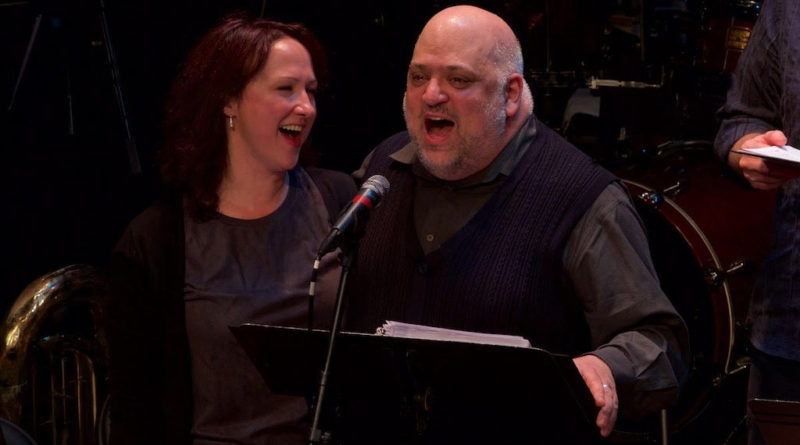INTERVIEW: 1928 Soviet farce given new life with musicalized adaptation
Photo: The Glorious Death of Comrade What’s-His-Name will play two special concert performances at Feinstein’s / 54 Below. Photo courtesy of the artist / Provided by Emily McGill Entertainment with permission.
It’s not everyday that a 1928 show from the Soviet Union plays Feinstein’s / 54 Below in Midtown Manhattan. That play, called The Suicide, has actually been adapted into a new musical with a book by David Bridel, music by Simon Gray and lyrics by Raymond Bokhour.
The updated show, called The Glorious Death of Comrade What’s-His-Name, will play two special concert performances at the cabaret venue. The first one is set for Monday, Jan. 20 at 9:30 p.m., while the second one, March 2 at 7 p.m., has recently been added due to demand.
The cast, under the direction of Don Stephenson, is a who’s who of New York theater royalty, including Christine Bokhour, Jim Borstelmann and Maia Guest, among others. Bokhour himself will actually lead the ensemble as the title character.
How this musical adaptation came to be is a story of chance and luck involving a search through an old library of books.
“The composer and myself are both members of the BMI Music Theatre Workshop, and we were literally looking around for things that we could turn into a musical,” Bokhour said in a recent phone interview. “I had a copy of this play that it’s based on. The play is called The Suicide, and it was sitting on my shelf for a long time because I had always loved it. I just passed my eyes on it, and I thought, oh right, I wonder if this could be turned into a musical. It turned into in some ways an unexpected challenge, but we knew that we wanted to shake it free of the original, of its very specific references to time and place.”
Bokhour said The Suicide had a robust life as a play, having been performed all around the world since its 1928 premiere in the Soviet Union. However, in order to musicalize the narrative, the creative team had to branch off and make the new adaptation completely its own.
Along the way, Bokhour didn’t think he would also be acting in the piece, but eventually his presence amongst the cast became a given.
“I was very interested in becoming a writer and becoming better at writing lyrics and writing for musical theater, and when we would present these things at the workshop, it just seemed very natural that I would stand up and sing that part,” he said. “As that happened, a lot of people were saying, ‘Oh, you’re writing yourself a really great part.’ I was like, ‘I don’t know if that’s the goal,’ and over the years of its development, we’ve tried different things. But it’s almost always been more … economical to have me in the part, but I started having a tremendous amount of fun with it. And, of course, it’s a character that comes natural to me, that specific kind of clown. So it just turned inevitable; it was certainly something fun.”
Although the source material has a serious title dealing with a distressing situation in the character’s life, this is actually a farce, and that means there are plenty of laughs to go around. The creative team on the musical has kept this humor intact, and when the audience laughs, it becomes obvious that they are offering some biting commentary on universal themes that can be found in both 1928 and 2020.
“There’s something in there, and I would say it has to do with the predicament of the powerless everyman who doesn’t quite have agency to express himself or even to live freely,” Bokhour said. “I think everybody today, no matter where they are politically, shakes their fists at the skies and curses the powers that be, whether it’s ‘I don’t like the right-leaning president,’ or ‘I don’t like the left-leaning president.’ It doesn’t matter. We all agree that we don’t have enough power ourselves, or we wish things were different.”
That political unrest fuels the comedy of the piece and also connects the material on the stage with the audience’s sentiments and opinions. Bokhour sees the musical continuing the trend of effective political comedy, which has seen a resurgence in recent years.
“I mean, think of the success of all the political comedy that’s happening today,” he said. “There’s always been political comedy, but … The Daily Show led the way in a lot of ways and all the late-night talk-show hosts and all the movies that come out that are even slightly political are serving such a great function for all of us.”
He added: “I’ve always felt that the right doesn’t trust big government, and the left doesn’t trust big business. But the word big is really central to both of those things, and the big powers that kind of dwarf the rest of us keeps us up at night frankly and makes it very difficult to live a peaceful life. … Our lead character’s real desire is to just live quietly and peacefully, but it gets twisted and turned around. In his pursuit of that, he becomes a bumbling mess, and so do all the people around him, too.”
By John Soltes / Publisher / John@HollywoodSoapbox.com
The Glorious Death of Comrade What’s-His-Name will play two concert performances at Feinstein’s / 54 Below in Midtown Manhattan. Performances run Monday, Jan. 20 at 9:30 p.m. and March 2 at 7 p.m. Click here for more information and tickets.

